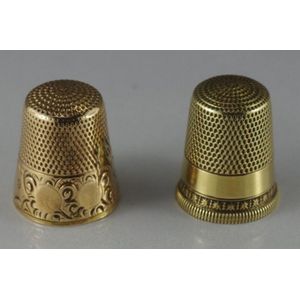Qing Dynasty Bronze Hand Warmers (Set of 3)
Three bronze hand warmers, Qing Dynasty, 19th century, comprising one of squat globular form with swing handle, the cover with a pierced diaper pattern; another smaller, the cover pierced with florette diaper, the base of each with impressed marks; and one with horizontally grooved sides and simulated bamboo swing handle, the cover with pierced trellis pattern, seal mark, (3), 11.3 cm; 9.5 cm; and 7 cm diameter
You must be a subscriber, and be logged in to view price and dealer details.
Subscribe Now to view actual auction price for this item
When you subscribe, you have the option of setting the currency in which to display prices to $Au, $US, $NZ or Stg.
This item has been sold, and the description, image and price are for reference purposes only.
- Qing Dynasty - The Qing Dynasty was the last imperial dynasty of China, ruling from 1644 to 1912. It was established by the Manchu people, who originated from the northeastern region of China. The Qing Dynasty was preceded by the Ming Dynasty and followed by the Republic of China.
- Diaper Motif - The diaper motif is a repeating geometric pattern in decorative arts that consists of small diamond or lozenge shapes arranged in a grid. The pattern is often used as a background or border on textiles, ceramics, metalwork, and other decorative items. It can be found in a variety of cultures and historical periods, and is often used in formal or ornamental designs. The name "diaper" comes from the pattern's resemblance to the criss-crossed fabric of a baby's diaper.
- Ming Dynasty - The Ming Dynasty was a ruling dynasty of China from 1368 to 1644. It succeeded the Yuan Dynasty and preceded the Qing Dynasty. The Ming Dynasty was established by Zhu Yuanzhang, a former Buddhist monk who became a rebel leader and eventually overthrew the Mongol Yuan Dynasty. During the Ming Dynasty, China experienced a period of relative stability and prosperity. The government was centralized and bureaucratic, with the emperor at the top of the hierarchy. The Ming Dynasty is known for its cultural achievements, including the development of porcelain, the invention of movable type printing, and the construction of the Great Wall of China.
- Bronze - An alloy of copper and tin, traditionally in the proportions of about 9 parts of copper to 1 part of tin.
The discovery of bronze in Western Asia in the 4th century enabled people to create metal objects which were superior to those previoulsy possible because of its strength and hardness, and it has been used throughout the world for weapons, coins, tools, statuary and other decorative items.
It is very fluid in a molten state, and its hardness, strength when set, and non-corrosive properties makes it most suitable for casting sculpture.
This item has been included into following indexes:
-
oriental objects
- bronze, other objects 2,593
- hand warmers 23
Visually similar items

3 thimbles inc. Sterling silver
Sold by
in
for
You can display prices in $Au, $US, $NZ or Stg.

A pair of sterling silver pierced salts having blue glass insert
Sold by
in
for
You can display prices in $Au, $US, $NZ or Stg.

Two gold thimbles, one 9ct, the other 14ct. Total weight 7gms
Sold by
in
for
You can display prices in $Au, $US, $NZ or Stg.

Two silver thimbles one with English hallmarks
Sold by
in
for
You can display prices in $Au, $US, $NZ or Stg.
